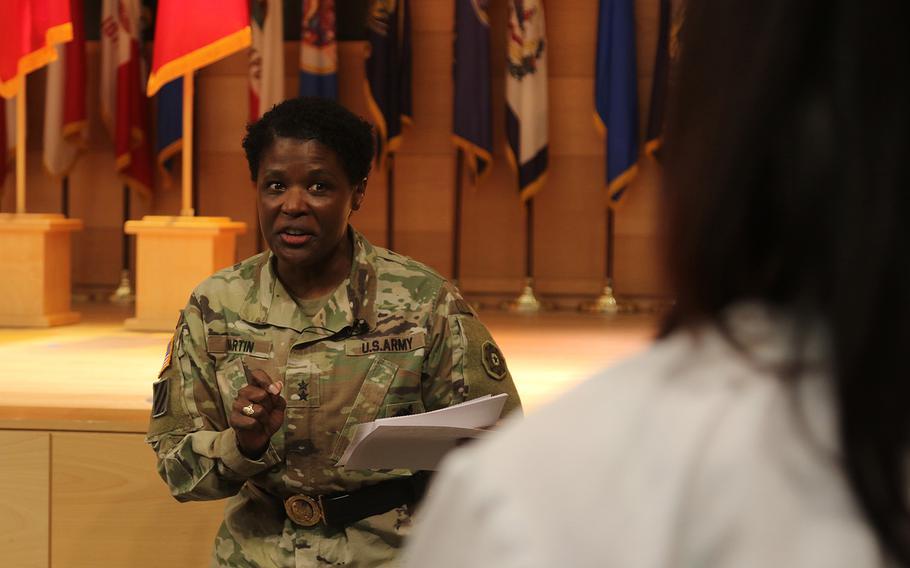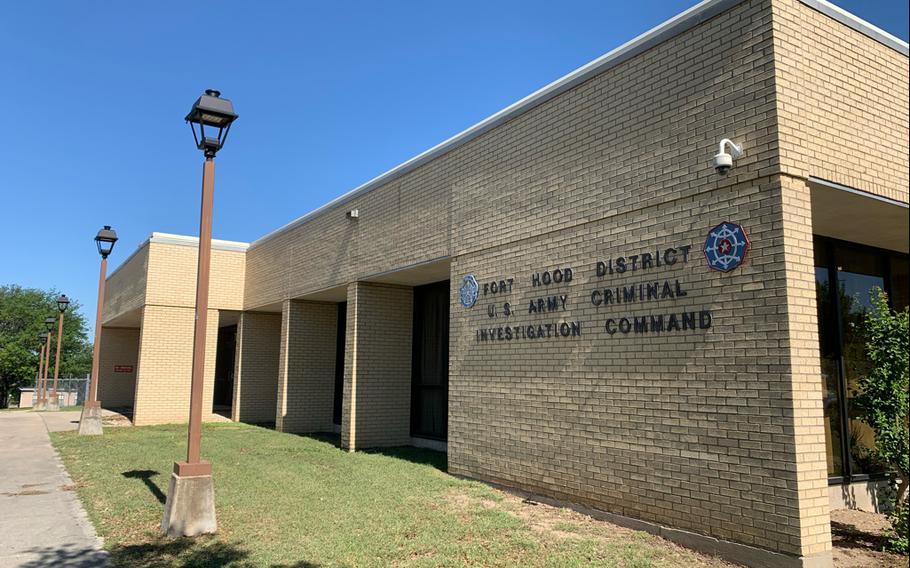
Maj. Gen Donna Martin, Army provost marshal general and commander of Army Criminal Investigation Command, at Aberdeen Proving Ground's Black History Month Observance on Feb. 23, 2021. Martin announced a restructuring of the criminal investigative agency on Thursday, May 6, 2021. (Marshall R. Mason/U.S. Army)
AUSTIN, Texas — The Army will split control of its criminal investigative agency from a general officer to a civilian director and add more civilian agents to its workforce in a major restructuring ignited by an independent committee that found the agency was failing to prevent and investigate crimes and support victims.
Maj. Gen. Donna Martin, Army provost marshal general and commander of Army Criminal Investigation Command, known commonly as CID, announced the restructuring Thursday, more than five months after the Fort Hood Independent Review Committee found the CID detachment at Fort Hood, Texas, “was unstable, under-experienced, over-assigned and under-resourced leading to inefficiencies that had an adverse impact on investigations, especially complex cases involving sex crimes and soldier deaths.”
With four main points of adjustment, Martin said the restructuring will “address many seams and gaps, and it will also address those findings from the Fort Hood independent review.”
“We did extensive research, calculations and staff work to develop more comprehensive courses of action to present the Army senior leaders,” she said.
Specifically, CID will split oversight of criminal investigations with a civilian director, add more civilian agents and support staff, create a new commissioned officer tract of criminal investigators and staff its security missions for senior leaders with military police instead of CID agents.
“Because military people tend to transition every two to three years, when we add our civilian capacity on top of our military special agents, we believe that what we will see is an enhanced partnership with our local and regional law enforcement partners. We believe that will help us help not only in Criminal Investigation Command, but it will help our commanders on our installations understand crime as it relates to what happens on the installation, and what happens off the installation,” Martin said.

An investigation into Fort Hood, Texas, and the operations of the base’s Criminal Investigation Command Detachment led to major reforms announced Thursday, May 6, 2021. (U.S. Army)
Created after the disappearance and death last year of Fort Hood Spc. Vanessa Guillen, the Fort Hood review committee released a report in December that offered 70 recommendations, with 11 focused on improving CID through its staffing, crime-suppression efforts and deepening investigations into drug crimes and soldier deaths.
The inefficiencies stemmed from staffing protocols and other policies and procedures that transcend Fort Hood, according to the report.
Guillen went missing from Fort Hood on April 22, 2020, while working in an arms room with the 3rd Cavalry Regiment. Spc. Aaron Robinson, another soldier in Guillen’s unit, is believed to have killed her with a hammer, then moved her body. Her remains were found June 30 alongside a river about 30 miles from the base. Robinson shot himself dead July 1 when approached by civilian law enforcement in Killeen, the town just outside Fort Hood.
Following the release of the report, Martin said she conducted an administrative investigation into the actions of personnel at the Fort Hood detachment and, as a result, fired the battalion operations officer because he “failed to conduct his duties as required in providing oversight of the investigation.”
In the new structure, the duties and responsibilities now assigned to one general officer serving simultaneously as the Army’s provost marshal general and the CID commander, will split. The Army will hire a civilian director with criminal investigative experience to lead the restructured CID with a general remaining the provost marshal.
To maintain and ensure independence of Army criminal investigations, the civilian director will initially report to the undersecretary of the Army, the service said. The provost marshal general will continue to report to the Army chief of staff and the Army secretary.
CID will increase the ratio of civilian criminal investigators to military special agents to improve investigative experience and grow effective partnerships with local and regional law enforcement agencies — something the review committee found to be lacking. More administrative and support staff will be added to detachments and hiring has already begun, Martin said.
The Army will create a new commissioned officer track for criminal investigations, similar to the Air Force and Navy. Until those officers are on the ground, a military police captain will command the detachments to oversee the new support staff, Martin said.
The Army will implement this redesign in phases, beginning at Fort Hood, Fort Bragg, N.C, and Fort Carson, Colo. They were chosen “due to the large population and a mixture of units that are assigned there,” Martin said.
“We don't know where that percentage [of civilian agents] will end up, but we're going to learn from these first three installations that we're going to implement,” she said.
Without providing an amount on the increased cost for these additional personnel, Martin said CID has “programmed our budget in order to support this enhancement of command growth.”
“We have some very baseline numbers, on what it costs to bring on a civilian with the equipment, with the training, all of that analysis has brought us to a dollar figure. Now where this will all end up, I don't know, it will depend on, again, those lessons learned from those three installations, and where we go in the future,” she said. “We have made a preliminary estimate of what it will cost through the next five years, but of course that's not solid, it's not locked in.”
Army CID manages all Defense Department crime lab needs and the restructuring will also increase capacity and hire more scientists to process evidence, Martin said.
“Our estimation is that you will see a shorter turnaround of these in the investigations,” she said. “Specifically [with] sexual-assault cases, we believe with this added resource of civilian personnel, and with our scientists in our lab, that we will turn around sex-assault cases sooner.”
Investigative timelines vary at each base, and the Fort Hood committee found when it came to investigating sex crimes, Fort Bragg had the longest average of 316 days between opening a case and referring it to a commander. Fort Hood had the next-longest average of 215 days, and Fort Carson averaged 185 days, according to the committee’s report.
The new resources should also help CID with deepening its investigations into drug crimes and soldier deaths, as was recommended by the Fort Hood committee.
“We've always investigated drug crimes. The majority of our drug-crime investigations come through urinalysis, so this is an extension of our policy. We now ask our agents to go for the source. So we're trying to find through this increased investigative activity, where their drugs are coming from, and how they're impacting our soldiers and our installations,” she said.
Better collaborations with local civilian law enforcement near the base will help improve investigations when a soldier dies by suicide off base. Agents will get more involved to better inform families about the case and provide additional assistance to them.
“In our death investigations and in the executive summaries that are sent to our Army senior leaders, we also have a behavioral health assessment that is done in every death and especially every suicide case, because we do want to understand the why these events are occurring,” Martin said.
CID now manages personal security for Army and Defense Department senior leaders with special agents serving on those missions. CID will retain oversight of that security program but task military police soldiers to carry out the work, Martin said.
“We have military police, who already have this additional skill identifier to perform protective service missions,” she said. “We don't believe that that transition will take them long, but I will tell you, it will probably be months.”
Most of these changes will take time, Martin said, but she is confident it “will make this an even better organization.”
“We are doing this reorganization, while we're still balancing the daily challenges of conducting felony criminal investigations. So crime doesn't stop, and you have to consider so many complex issues,” she said.
Martin, who took command of CID in July, is expected to relinquish her post to her deputy, Brig. Gen. Duane Miller, who was named in February as her successor. A change-of-command date has not been set, and Martin’s new position in the Army has not been announced.
“Maj. Gen. Donna Martin led an intensive five-month structural redesign to create an organization with enhanced capabilities and capacity, organized with and led by civilian and military agents, military officers and enlisted soldiers,” acting Army Secretary John Whitley said. “We are very confident these organizational changes address the committee’s CID-related recommendations and lead us into the future.”
Whitley on Thursday also signed a new Army directive to improve the Sexual Harassment/Assault Response and Prevention program, known as SHARP. The directive will better protect and inform victims of sexual assault and sexual harassment and immediately implements several SHARP-related findings and recommendations from the Fort Hood review committee.
The directive includes provisions improving the issuance of military-protective orders and the process by which sexual-assault victims receive case notifications. It also expands a new Forces Command policy across the Army that requires when a soldier files a sexual-harassment complaint, commanders must appoint investigating officers from outside the brigade.
The provisions of this directive take effect immediately for the Army, the Army National Guard and the Army Reserve.
"While we continue our work to redesign the current program, these policy changes will help to ensure that a soldier's report of sexual assault or sexual harassment is always met with a timely and effective response," Whitley said. "Soldiers must be confident that they can raise allegations of sexual assault or sexual harassment, quickly receive the protection they need, and be treated with dignity and respect throughout the process."